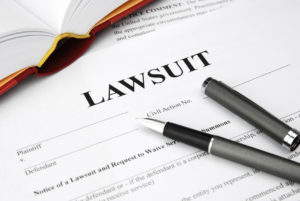Defendant

Most personal injury cases settle without the need to file a personal injury lawsuit or go to court. However, Texas tort laws allow injured parties to file lawsuits seeking to recover damages for personal injuries. When an insurance company refuses to settle a claim, a plaintiff may seek damages from a defendant in court.
Defendants in personal injury cases are the parties being sued for damages. A defendant allegedly caused an injury or death because they breached their duty of care. Therefore, the injured party seeks to hold the defendant financially liable for damages.
Plaintiffs are the injured parties in personal injury lawsuits. They file a lawsuit demanding compensation for damages. The plaintiff has the burden of proving their allegations by a preponderance of the evidence.
A preponderance of the evidence means there is a greater than 50% chance the defendant caused the plaintiff’s injuries and damages. A preponderance of the evidence is a lower standard of proof than beyond a reasonable doubt.
Table of Contents
What Are the Roles of Plaintiffs and Defendants in Personal Injury Lawsuits?
Each party has a distinct role during the lawsuit. While each personal injury case is unique, injury lawsuits generally have similar steps to reach a trial and verdict.
What is the Plaintiff’s Role in a Personal Injury Lawsuit?
The plaintiff has the burden of proving the defendant is liable for their damages. That requires the plaintiff to prove causation, fault, and liability. Generally, the plaintiff must prove the legal elements of negligence:
- Duty of Care – The defendant owed a legal obligation to the plaintiff to act with reasonable care to prevent an injury or harm.
- Breach of Duty – The defendant breached the duty of care by failing to act with reasonable care given the circumstances.
- Causation – The defendant’s acts or omissions were the direct and proximate cause of the plaintiff’s injuries.
- Damages – The plaintiff sustained damages because the defendant breached a duty of care.
Damages in a personal injury case may include economic damages. These damages represent the plaintiff’s financial losses. They include:
- Lost wages
- Medical bills
- Diminished earning potential
- Out-of-pocket expenses
- Other costs.
The plaintiff may also receive non-economic damages. These damages compensate the plaintiff for the “pain and suffering” caused by the defendant’s conduct. These damages may include:
- Mental anguish
- Emotional suffering
- Physical discomfort
- Loss of quality of life
- Permanent impairments.
Some plaintiffs might receive punitive damages. These damages “punish” the defendant for gross negligence, malice, or fraud. Even though punitive damages do not compensate the plaintiff for damages, the plaintiff receives the money. Punitive damages are only awarded in a small number of cases.
What is the Defendant’s Role in a Personal Injury Lawsuit?

The defendant argues that they are not liable for the plaintiff’s damages because they did not cause the person’s injuries. The insurance company should hire a defense attorney to defend the lawsuit. If the defendant does not have insurance, they are responsible for hiring a lawyer if they want one to represent them in the lawsuit.
The defendant may present evidence refuting the plaintiff’s allegations of negligence, fault, and liability. A defendant may also raise affirmative defenses to the lawsuit, including failing to file a lawsuit before the expiration of the Texas statute of limitations. The defendant may also raise allegations of contributory fault.
If the jury finds the defendant is liable for damages, the insurance company is liable up to the policy limits. Any amount exceeding the policy limits becomes a personal judgment against the defendant.
Defendants and plaintiffs may appeal the jury verdict if they disagree with the trial’s outcome.
Examples of Defendants in Personal Injury Cases
Any party accused of causing another person injury or harm can be named a defendant in a personal injury lawsuit. The type of case dictates who might be named as a defendant. Examples of defendants in a personal injury lawsuit include, but are not limited to:
- Automobile Accidents – At-fault drivers, pedestrians, bicyclists, motorcyclists, rideshare drivers, and government entities
- Premises Liability Claims (slip and fall accidents) – Commercial property owners, government agencies, homeowners, landlords, tenants, and business owners
- Commercial Truck Accidents – Truck drivers, trucking companies, shippers, loaders, truck and parts manufacturers, and maintenance and repair shops
- Medical Malpractice Claims – Physicians, hospitals, medical facilities, laboratories, nurses, chiropractors, dentists, and other health care providers
- Product Liability Claims – Designers, manufacturers, distributors, and sellers
- Construction Accidents – Property owners, engineers, contractors, architects, product manufacturers, and subcontractors
- Dog Bites and Animal Attacks – Dog owners, property owners, landlords, and tenants
Your legal team thoroughly investigates the cause of your injury and accident. They identify each party who could potentially be responsible for your damages. By identifying all parties who share liability for an injury claim, they increase your chance of receiving maximum compensation for your damages.
Schedule a Free Consultation With Our Fort Worth Personal Injury Lawyer
Our law firm handles all types of personal injury claims. We help accident victims and their families receive the compensation they deserve after a negligent party causes an injury. Call us now at (817) 420-7000 to schedule a free consultation with one of our experienced Fort Worth personal injury attorneys.


